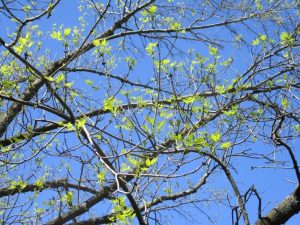Since there are still nearly 5-weeks before the official start of summer, the accumulation of growing-degree-days (GDD) will continue to accelerate over the next several weeks. Many of our landscape insect pests will be rapidly emerging and be entering their best control windows before they potentially cause feeding symptoms. This writing contains part 1 of 2 parts of only a handful of the many late spring landscape insect pests that require monitoring. Some could more properly be called mid-spring pests, especially in southern NJ. Those included within part 1 of this blog are: Four-lined plant bug; Douglas-fir needle midge; Pine needle scale; & Elongate hemlock scale.
Landscape Pest Notes: Some Mid-Spring Insects/Mites
As we enter the last week of April, many of our mid-spring landscape insect/mite pests continue to awaken & cause feeding symptoms on our ornamentals. This blog only talks over some of the typical mid-spring pests that plague our landscapes. Those discussed within include: Southern Red Spider Mites; Gypsy Moths; Evergreen Lace Bugs (e.g., rhododendron, azalea, & andromeda lace bugs); Nantucket Pine Tip Moth; Birch Leaf Miner; Hemlock Woolly Adelgid; Plant Leaf Galls (eriophyid mites).
Eastern Tent Caterpillar: The Landscape Harbinger of Spring
Throughout much of NJ during this week, the growing degree days (GDD) will be increasing consistently. By the end of the week, many areas will exceed 90 GDD, which means the eastern tent caterpillars will begin to hatch. Not all eggs will hatch at once since a staggered hatching period will potentially increase survival rates if the weather happens to cool again.
The photographs of the eastern tent caterpillar’s life cycle included in this blog were all taken during the spring of 2016 at the same site in Freehold, NJ. They are placed in chronological order covering a time span of 10 weeks from 1st egg hatch on 3/23/16 to late pupation on 6/2/16. In 2016, central NJ experienced a relatively warm early spring that enabled the speedy first hatching.
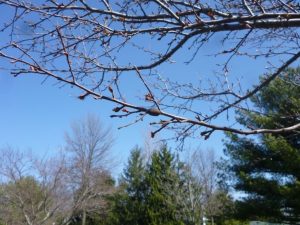
Date: 3/23/16 (No hatch). Do you see it? One inch long Tent Cat egg mass overwinters encircling 2-3 year old twigs. (Photo Credit: Steven K. Rettke, Rutgers Coop. Ext.)
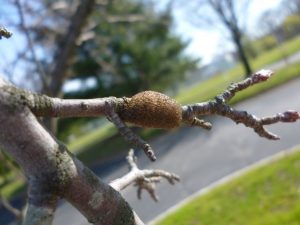
Date: 3/23/16 (No Hatch). Close-up of the Tent Cat egg mass. It has the appearance & feel of styrofoam. (Photo Credit: Steven K. Rettke, Rutgers Coop. Ext.)
Landscape Pest Notes: Some Early Spring Insects/Mites
The accumulation of heat units (Growing Degree Days (GDD)) is increasing rapidly across many areas of New Jersey as we soon enter into the early weeks of April. If past histories or present-day monitoring indicate the need for interventions, then the best control windows for an increasing number of insect/mite pests are beginning to occur. The following is an incomplete listing of a handful of some of our early season landscape pests that may need to be scouted & possibly controlled. The insect/mite pests included here are: Hemlock Rust Mites; White Pine Weevils; Native Holly Leafminers; European Pine Sawflies; Honeylocust Spider Mites; White Pine Aphids; and Eastern Spruce Gall Adelgids.
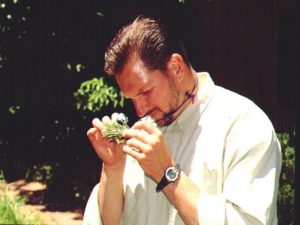
As our landscapes start to “wake-up” with warming temperatures, the insect & mite pests will begin activity. (Photo Credit: Steven K. Rettke, Rutgers Coop. Ext.)
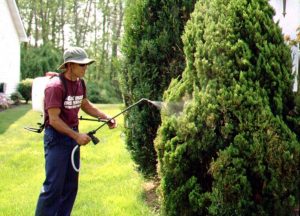
When monitoring indicates controls are warranted, then pesticides can prevent early spring pests from building-up. (Photo Credit: Steven K. Rettke, Rutgers Coop. Ext.)
Control of Nuisance Fungi in Landscape Mulch
Overview:
When used properly, mulches and composts can improve soils and provide many beneficial effects to plant health and vigor. Undesirable nuisance fungi, however, may also occur when different types of mulches or composts are used under certain conditions. Some of the more common examples of these nuisance fungi include the shotgun or artillery fungus (Sphaerobolus), slime molds (Physarum), stink horns (Mutinus), bird’s nest fungi (Crucibularium), toadstool mushrooms, and several plant pathogens. Although these nuisance fungi are mostly natural decomposers of organic matter and most of them are harmless, this blog discusses how the various nuisance fungi sometimes associated with mulches and composts can be controlled or minimized.
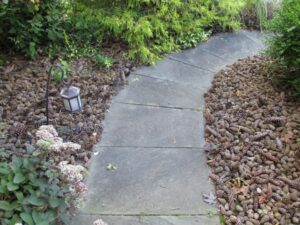
Organic landscape mulches & composts under certain conditions can promote nuisance fungi. (Photo Credit: Steven K. Rettke, Rutgers Coop. Ext.)
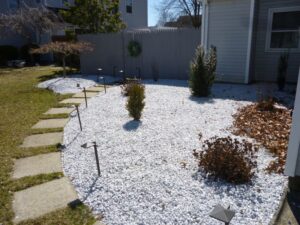
Although stone mulch will certainly eliminate any growth of nuisance fungi, it does not benefit plant health. (Photo Credit: Steven K. Rettke, Rutgers Coop. Ext.)
Accurately Timing Scouting by Using Plant Phenological Indicators
Challenges of Pest Controls
Accurately timing a control tactic against the most vulnerable stage of an insect’s development allows for the use of biorational pesticides as well as less use of traditional pesticides. Unfortunately, accurately timing controls is difficult because of the complex array of landscape plants and pests that can be present on any one site. IPM methods require knowledge of the pest’s life cycle stages and when the vulnerable stage occurs for each pest. It requires knowledge of what pesticides will suppress the pest as well as their relative toxicities. This extensive amount of information can become overwhelming, especially to the less experienced landscaper or arborist.
Some landscape managers often resign to the easy, yet environmentally unsound practice of using four or more preventative cover sprays of pesticides each year. Studies have shown that typically only 2% of a blanket spray actually hits a targeted pest, with the remaining 98% contaminating the surrounding environment. Is there another way that pesticides can be applied more intelligently?
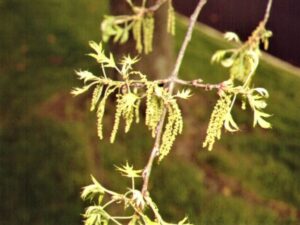
Farmers know that when White Oak leaves are the size of a squirrel’s ear, THEN…. (Photo Credit: Steven K. Rettke, Rutgers Coop. Ext.)
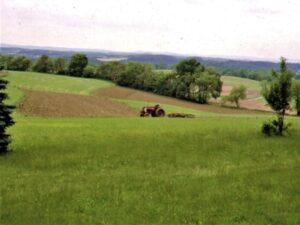
….THEN, =It is time to Sow Corn into the planting fields. (Photo Credit: Steven K. Rettke, Rutgers Coop. Ext.)

